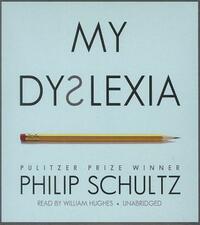Take a photo of a barcode or cover
More so about the emotional toll learning disabilities takes on people and what it takes to overcome it.
Such an inspiring memoir, for individuals who have dyslexia, have a family member with dyslexia, or simply a reader who would just like to understand and learn about dyslexia.
I appreciated how open and honest Philip Schultz was about his journey, he provides readers with a great insight on his struggles with a learning disability.
I appreciated how open and honest Philip Schultz was about his journey, he provides readers with a great insight on his struggles with a learning disability.
emotional
informative
inspiring
reflective
medium-paced
This is a memoir, not a guide to dyslexia. It’s a great way to understand the effects of dyslexia on a persons outlook rather then the technical books that tell you about the symptoms. It was a great break from the more technical books I’ve been reading.
In My Dyslexia, Philip Schultz generously opens up and shares how his brain functions in a world that is not conducive to differences. Perhaps even more generous is his willingness to share what is in his heart - a lifetime of hurt, pain, pride, and joy.
This memoir is ideal to connect to an older (white privileged) generation who had zero access to learning supports but found ways to get through. This book was not written for me, and I found little connection to his experience.
I would’ve loved if this book were fleshed out a little bit more, because it was really enjoyable and informative. Leaves you wanting more. Easily would’ve been a 5-star book if it had a little bit more length and went into more detail as the author explored the effect dyslexia had on certain aspects of his life.
As someone with dyslexia, I really hoped to get more out of this quick read. It might be that this was targeted for an older generation though.
Merged review:
As someone with dyslexia, I really hoped to get more out of this quick read. It might be that this was targeted for an older generation though.
Merged review:
As someone with dyslexia, I really hoped to get more out of this quick read. It might be that this was targeted for an older generation though.
Philip Schultz’s story will inspire and encourage anyone whose life has been impacted by dyslexia. Schultz, who did not learn to read until he was eleven, did not discover he was himself dyslexic until he compared his own reading difficulties to those of his young son, a confirmed sufferer of the condition. Today, despite his continuing struggle with language skills, Philip Schultz is a Pulitzer Prize-winning poet. His remarkable story and insights into dealing with dyslexia can be found in My Dyslexia the memoir in which he recounts his early schooling struggles, how he overcame the condition, and what his life is like today.
Much of what Schultz describes will be heartbreaking to the parents and grandparents of children struggling to keep up with their peers in the classroom. Learning disabilities are difficult to cope with – as parents and grandparents of children who suffer from them, we already know that. What most of us probably fail to understand fully is the emotional pain our children are suffering as they deal with the social stigma of being different from the majority of their friends and classmates. Tragically, as Schultz stresses, these emotional scars are likely to last a lifetime.
Schultz, poet that he is, has a beautiful way with words that allows him to describe in vivid images what he has gone through, how he very suddenly learned to read at age eleven, and how he must compensate for his poor reading skills even today. Consider, for instance, his description of what reading is like for him now:
As I read, a kind of subtle bartering between uncertainty and hunger for knowledge goes on in my mind, in which I must conquer a feeling of hopelessness and anxiety. I’ve learned to read the way a runner learns to expect and find his second and third winds, the way an athlete pushes himself beyond where it is comfortable to go. I read word by word, sometimes congratulating myself on the completion of a sentence, each paragraph and chapter,
Or this description of what it was like for him in the classroom:
I understood that I was different from other kids. I lived in a world of differences measured not by appearances, wealth, or even intelligence. The world I lived in involved struggle for control over my thoughts and actions. My differentness felt freakish. My brain wouldn’t obey me, nor my parents or my teachers. If I had trouble learning to read a clock, know my left from my right, hearing instructions – things everyone else seem to do easily – how could I trust my own thoughts or anything about myself?
The topics addressed by My Dyslexia should help parents and grandparents better understand what their children are experiencing. Among subjects addressed are: why the children often prefer being alone; why they so often attract the attention of bullies; their difficulty with poor self-image; and the disintegration reaction experienced when such a child feels great pressure to explain himself. Books like this one will make it easier for parents, grandparents, and teachers to find the patience and understanding needed to help their children and students cope successfully with a condition that will so critically impact the rest of their lives.
The good news is that there is hope for them – and Philip Schultz proves it.
Much of what Schultz describes will be heartbreaking to the parents and grandparents of children struggling to keep up with their peers in the classroom. Learning disabilities are difficult to cope with – as parents and grandparents of children who suffer from them, we already know that. What most of us probably fail to understand fully is the emotional pain our children are suffering as they deal with the social stigma of being different from the majority of their friends and classmates. Tragically, as Schultz stresses, these emotional scars are likely to last a lifetime.
Schultz, poet that he is, has a beautiful way with words that allows him to describe in vivid images what he has gone through, how he very suddenly learned to read at age eleven, and how he must compensate for his poor reading skills even today. Consider, for instance, his description of what reading is like for him now:
As I read, a kind of subtle bartering between uncertainty and hunger for knowledge goes on in my mind, in which I must conquer a feeling of hopelessness and anxiety. I’ve learned to read the way a runner learns to expect and find his second and third winds, the way an athlete pushes himself beyond where it is comfortable to go. I read word by word, sometimes congratulating myself on the completion of a sentence, each paragraph and chapter,
Or this description of what it was like for him in the classroom:
I understood that I was different from other kids. I lived in a world of differences measured not by appearances, wealth, or even intelligence. The world I lived in involved struggle for control over my thoughts and actions. My differentness felt freakish. My brain wouldn’t obey me, nor my parents or my teachers. If I had trouble learning to read a clock, know my left from my right, hearing instructions – things everyone else seem to do easily – how could I trust my own thoughts or anything about myself?
The topics addressed by My Dyslexia should help parents and grandparents better understand what their children are experiencing. Among subjects addressed are: why the children often prefer being alone; why they so often attract the attention of bullies; their difficulty with poor self-image; and the disintegration reaction experienced when such a child feels great pressure to explain himself. Books like this one will make it easier for parents, grandparents, and teachers to find the patience and understanding needed to help their children and students cope successfully with a condition that will so critically impact the rest of their lives.
The good news is that there is hope for them – and Philip Schultz proves it.
informative
reflective
fast-paced


